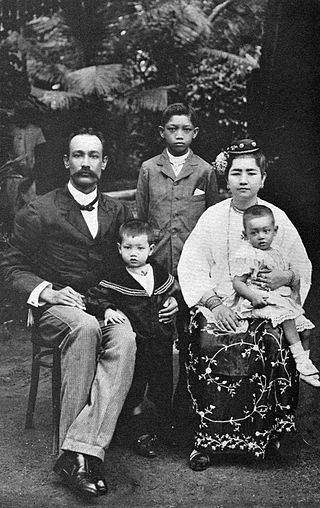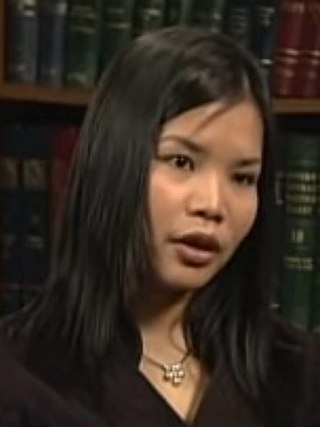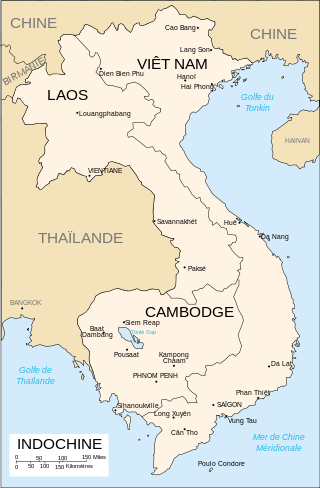Related Research Articles

The Shan people, also known as the Tai Long or Tai Yai, are a Tai ethnic group of Southeast Asia. The Shan are the biggest minority of Burma (Myanmar) and primarily live in the Shan State of this country, but also inhabit parts of Mandalay Region, Kachin State, Kayah State, Sagaing Region and Kayin State, and in adjacent regions of China, Laos, Assam and Meghalaya, Cambodia, Vietnam and Thailand. Though no reliable census has been taken in Burma since 1935, the Shan are estimated to number 4–6 million, with CIA Factbook giving an estimate of five million spread throughout Myanmar which is about 10% of the overall Burmese population.

The Jingpo people are an ethnic group who are the largest subgroup of the Kachin peoples. The greater name for all the Kachin peoples in their own Jingpo language is the Jinghpaw. Other endonyms include Zaiwa, Lechi, Lisu, Maru, Hkahku,

A refugee camp is a temporary settlement built to receive refugees and people in refugee-like situations. Refugee camps usually accommodate displaced people who have fled their home country, but camps are also made for internally displaced people. Usually, refugees seek asylum after they have escaped war in their home countries, but some camps also house environmental and economic migrants. Camps with over a hundred thousand people are common, but as of 2012, the average-sized camp housed around 11,400. They are usually built and run by a government, the United Nations, international organizations, or non-governmental organization. Unofficial refugee camps, such as Idomeni in Greece or the Calais jungle in France, are where refugees are largely left without the support of governments or international organizations.

The Karen, also known as the Kayin, Kariang or Kawthoolese, are an ethnolinguistic group of Sino-Tibetan language-speaking peoples. The group as a whole is heterogeneous and disparate as many Karen ethnic groups do not associate or identify with each other culturally or linguistically. These Karen groups reside primarily in Kayin State, southern and southeastern Myanmar. The Karen account for around seven percent of the Burmese population. Many Karen have migrated to Thailand, having settled mostly on the Myanmar–Thailand border. A few Karen have settled in the Andaman and Nicobar Islands, India, and other Southeast Asian and East Asian countries.

The Rohingya people are a stateless Indo-Aryan ethnic group who predominantly follow Islam and reside in Rakhine State, Myanmar. Before the Rohingya genocide in 2017, when over 740,000 fled to Bangladesh, an estimated 1.4 million Rohingya lived in Myanmar. Described by journalists and news outlets as one of the most persecuted minorities in the world, the Rohingya are denied citizenship under the 1982 Myanmar nationality law. There are also restrictions on their freedom of movement, access to state education and civil service jobs. The legal conditions faced by the Rohingya in Myanmar have been compared to apartheid by some academics, analysts and political figures, including Nobel laureate Bishop Desmond Tutu, a South African anti-apartheid activist. The most recent mass displacement of Rohingya in 2017 led the International Criminal Court to investigate crimes against humanity, and the International Court of Justice to investigate genocide.
Burmese people or Myanma people are citizens or people from Myanmar (Burma), irrespective of their ethnic or religious background. Myanmar is a multi-ethnic, multi-cultural and multi-lingual country. The Burmese government officially recognises 135 ethnic groups, who are grouped into eight 'national races,' namely the Bamar (Burmans), Shan, Karen, Rakhine (Arakanese), Mon, Kachin, Chin, and Kayah (Karenni). Many ethnic and ethnoreligious communities exist outside these defined groupings, such as the Burmese Chinese and Panthay, Burmese Indians, Anglo-Burmese, and Gurkhas.

The Anglo-Burmese people, also known as the Anglo-Burmans, are a community of Eurasians of Burmese and European descent, who emerged as a distinct community through mixed relationships between the British and other Europeans and Burmese people from 1826 until 1948 when Myanmar gained its independence from the British Empire. Those who could not adjust to the new way of life after independence and the ushering in of military dictatorship are dispersed throughout the world. How many stayed in Myanmar is not accurately known.

The Kayan are a sub-group of Red Karen, Tibeto-Burman ethnic minority of Myanmar (Burma). The Kayan consists of the following groups: Kayan Lahwi, Kayan Ka Khaung (Gekho)Kayan Kadao, Kayan Lahta, Kayan Ka Ngan. Kayan Kakhi and, sometimes, Bwe people (Kayaw). They are distinct from, and not to be confused with, the Kayan people of Borneo.

The peopling of Thailand refers to the process by which the ethnic groups that comprise the population of present-day Thailand came to inhabit the region.
The Gateway Protection Programme was a refugee resettlement scheme operated by the Government of the United Kingdom in partnership with the United Nations High Commissioner for Refugees (UNHCR) and co-funded by the European Union (EU), offering a legal route for a quota of UNHCR-identified refugees to be resettled in the UK. Following a proposal by the British Home Secretary, David Blunkett, in October 2001, the legal basis was established by the Nationality, Immigration and Asylum Act 2002 and the programme itself launched in March 2004. The programme enjoyed broad support from the UK's main political parties.

Zoya Phan is a Burmese political activist. She resides in the United Kingdom, and is the Campaign Manager of the human rights organization Burma Campaign UK. She was an outspoken critic of the Burmese government when it was under direct military rule, repeatedly calling for democratic reform in Burma, as well as economic sanctions from both the British government and the United Nations. Following political changes in the country from 2011, she has continued to campaign for international action to end ongoing human rights violations, especially regarding the use of rape and sexual violence against ethnic women by the Burmese Army.
The Karen Human Rights Group (KHRG) is a grassroots Karen-led human rights organisation, established in Karen State during 1992 and it is now operating across rural southeast Burma/Myanmar. With over twenty years of experience. KHRG is recognised internationally as an authority on major issues such as internal displacement, forced labour, landmines, conflict and land confiscation in southeast Burma/Myanmar. KHRG works directly with "rural villagers who are suffering abuses such as forced labor, systematic destruction of villagers and crops, forced relocations, extortion, looting, arbitrary detention, torture, sexual assault and summary executions." Most of these abuses were committed by soldiers and officials of the State Peace & Development Council (SPDC), Burma's previous ruling military junta. The organisation's goal is to support villagers in rural Burma, by helping them develop strategies to resist abuse and by translating their testimonies for worldwide distribution, accompanied by supporting photos and documentary evidence.

Mae La, Beh klaw ,(S'gaw Karen: မဲၣ်လးဒဲကဝီၤ, ဘဲကျီး) is a refugee camp in Thailand. It was established in 1984 in Tha Song Yang District, Tak Province in the Dawna Range area and houses 50,000 Karen refugees; the number continues to rise as of June 2019. Mae La is the largest refugee camp for Karen refugees in Thailand. Over 90% are the persecuted ethnic Karen. The camps are overseen and run by the Thailand Burma Border Consortium (TBBC), a union of 11 international non-governmental organizations that provide food, shelter and non food items to the Burmese refugees and displaced people.

The Indochina refugee crisis was the large outflow of people from the former French colonies of Indochina, comprising the countries of Vietnam, Cambodia, and Laos, after communist governments were established in 1975. Over the next 25 years and out of a total Indochinese population in 1975 of 56 million, more than 3 million people would undertake the dangerous journey to become refugees in other countries of Southeast Asia, Hong Kong, or China. According to the United Nations High Commissioner for Refugees, 250,000 Vietnamese refugees had perished at sea by July 1986. More than 2.5 million Indochinese were resettled, mostly in North America, Australia, and Europe. More than 525,000 were repatriated, either voluntarily or involuntarily, mainly from Cambodia.
Burmese Australians are Australian citizens or permanent residents who carry full or partial ancestry from Myanmar, also known as Burma, a country located in Southeast Asia. The majority ethnic group of Burma is the Bamar people but there are also numerous Burmese ethnic minorities.

The Karen conflict is an armed conflict in Kayin State, Myanmar. It is part of the wider internal conflict in Myanmar between the military government and various minority groups. Karen nationalists have been fighting for an independent state, known as Kawthoolei, since 1949. The Karen National Union (KNU) and its Karen National Liberation Army (KNLA) are the most prominent Karen rebel groups. Hundreds of thousands of civilians have been displaced by the conflict, many of whom fled to neighbouring Thailand and survive in refugee camps.

In 2015, hundreds of thousands of Rohingya people were forcibly displaced from their villages and IDP camps in Rakhine State, Myanmar, due to sectarian violence. Nearly one million fled to neighbouring Bangladesh and some travelled to Southeast Asian countries including Malaysia, Indonesia, Cambodia, Laos and Thailand by rickety boats via the waters of the Strait of Malacca, Bay of Bengal and the Andaman Sea.
Kler Heh is a Thai-Burmese former professional footballer who plays as a winger.
A refugee crisis can refer to difficulties and dangerous situations in the reception of large groups of forcibly displaced persons. These could be either internally displaced, refugees, asylum seekers or any other huge groups of migrants.
The Fall of Manerplaw occurred on 27 January 1995, when the village of Manerplaw was captured by the Tatmadaw and the Democratic Karen Buddhist Army (DKBA). Manerplaw was the headquarters of two armed opposition groups, the Karen National Union (KNU) and the All Burma Students' Democratic Front (ABSDF). The final military assault by the Tatmadaw, aided by positional information provided by the DKBA, was met with little resistance by the KNLA, whose leaders had ordered a tactical retreat.
References
- 1 2 Geff Green; Eleanor Lockley (April 2012), Surveillance without borders: the case of Karen refugees in Sheffield, Sheffield Hallam University, CiteSeerX 10.1.1.309.1484 ,
This further fuelled the belief that the 'spy' in the group was a Burman participant (not part of the Karen community). Petty tensions between the different groups around the provision of dual language interpreters appeared to move onto a new level. ... Later discussions about the incident with Sheffield's Burmese refugee community identified a significant part of what had happened. A disaffected member of Sheffield's Karen community (who not surprisingly have their own internal tensions, disputes, disagreements and power-struggles), was unburdening him/herself to a friend in Burma by phone and the call was hacked / monitored and recorded.
- ↑ "Finding a new identity and helping out: An important and challenging role for young Burmese refugees in Sheffield". European Resettlement Network. Archived from the original on 2019-03-06. Retrieved 2020-11-16.
The young people from the Karen refugee community in Sheffield have a unique and important role to play in their new community of nearly 300 ... Many of them were born in the refugee camps on the Thai border with Burma and others fled with their parents from conflict areas during the many periods of warfare between the Karen and the Burmese Military (tatmadaw) in the Karen territories of Burma.
- 1 2 "Burma's Karen refugees struggle in UK". BBC. 11 January 2010.
The BBC's Vincent Dowd caught up with two ethnic Karen families who found asylum in the UK and whose stories were documented in the film Moving to Mars . ... the largest of several camps housing tens of thousands of refugees from nearby Burma. Most, like him, are from the Karen ethnic group - and have fled from the hard rule of Burma's military government.
- ↑ "The Karen of Burma in Sheffield". Amnesty International. 29 December 2007.
The men are among 130 Burmese people now living in Sheffield, most of whom are of Karen ethnicity and who came from the Burma-Thai border where around 150,000 refugees have languished in nine camps, some for decades. ... The Burmese refugees came to the UK as part of the Gateway Programme, under which highly vulnerable refugees and their families identified by the UNs refugee agency UNHCR, are resettled under arrangements between councils and the Home Office. The initiative was founded in 2004 and Sheffield and Bolton were the first cities to accept refugees, followed by Brighton, Rochdale, Norwich, Hull, Bury and Motherwell.
- ↑ "Michael Jeewa is chief executive of the Myanmar/ Burma Relief and Welfare Association, which supports Burmese migrants in the UK". The Guardian . 25 May 2005.
We estimate 8,000 Burmese people live in the UK: 5,000 in London and most of the others in Cardiff, Portsmouth and Gosport. ... The event, on Sunday, will be the largest gathering of Burmese people in Britain to date.
- ↑ Jenny Clarke (7 June 2005). "Burmese population celebrate their new year". Waltham Forest Guardian .
Burmese people in Stratford were invited to celebrate their new year at a festival with music, dancing and food. The area has one of the highest populations of Burmese people in the UK according to organisers of the London Thinngyan, which means water festival.
- ↑ Pia Jolliffe (2016). "Learning and integration in the UK". Learning, Migration and Intergenerational Relations: The Karen and the Gift of Education. Palgrave Macmillan. ISBN 978-1137572172.
In the UK, Karen clothes are important markers of socio-political identity and memory. The Karen wear them at different festive occasions, such as the Karen New Year ... Participant observation during field-work in Sheffield and London confirmed that Karen children and adults continue to wear their homespun clothes at festive occasions like the Karen New Year.
- ↑ "Burmese refugees flee oppression and violence for a life of hope in Sheffield". Sheffield Star . 22 December 2016.
Between 2005 and 2008, 216 Burmese refugees were resettled in Sheffield.
- ↑ "UNHCR welcomes acceptance of resettled refugees in Sheffield, UK". United Nations High Commissioner for Refugees. 19 May 2005.
A group of 25 refugees are currently undergoing several days of briefing and induction courses outside London before being transferred to Sheffield in the north next week. Earlier this week, another group of 26 Burmese was transferred to Sheffield under the programme organised in co-operation with the city authorities. The Burmese arrival at Heathrow airport is a continuation of the UK's programme and commitment under the Gateway scheme to resettle 500 refugees in Britain each year. Most of the Burmese arriving this week are women and children.
- ↑ Johnston, Patrick (21 July 2015). "Thai refugee eyeing Premier League with Sheffield United". Reuters.
- ↑ "Welcome to Sheffield Reflections on 8 years experience of receiving resettled refugees at the local level" (PDF). Sheffield City Council.
Resettled refugees in the Yorkshire and Humber region: Burmese and Karen; Cause of flight: State persecution of minority groups and political activists in Myanmar
- ↑ "Karen Katz makes a hit documentary about Burmese refugees". The Jewish Chronicle . 28 October 2009.
Titled Moving to Mars, it tells the story of two refugee families from Burma who are given the opportunity to start their lives again and resettle in Sheffield as part of a UN scheme.
- ↑ Geff Green; Eleanor Lockley (2013). "Surveillance without Borders: The Case of Karen Refugees in Sheffield". In Babak Akhgar (ed.). Emerging Trends in ICT Security (Emerging Trends in Computer Science and Applied Computing). Morgan Kaufmann Publishers. ISBN 978-0124114746.
It also raised suspicions that were directed toward non-Karen Burmese in Sheffield, specifically those undertaking the training, partly because of their non-Karen status. However, a discussion with one of the community leaders also indicated that the possibility of a member of the Karen community being in the pay of the Burmese government could not be ruled out. This indication the level of collective paranoia that can be induced by a cyber-attack that is underpinned by decades of war and oppression.
- ↑ Emerging Communities in Hounslow and West London: Mapping and Needs Assessment, Social Policy Research Centre, October 2014, CiteSeerX 10.1.1.309.1484 ,
We know very little about the mental health needs of Burmese refugees in the UK, people coming from extended periods of conflict in their homeland ... One study reports Burmese migrants in Sheffield faced barriers in accessing public services because of their low levels of education, poor knowledge of English and poor knowledge of their entitlements.